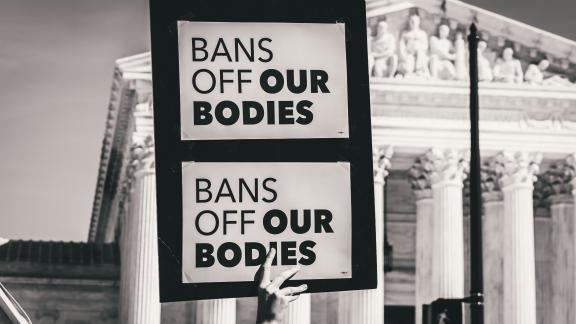What is Roe v. Wade?
Roe v. Wade is a landmark Supreme Court decision from 1973 which effectively legalized abortion across all US states.
The case focused on a woman named anonymously at the time as Texan resident Jane Roe, in her case against Henry Wade, District Attorney of Dallas County, Texas. Roe sought an abortion after discovering she was pregnant – however Texan law denied her one because it stated that an abortion would only be permitted if it would save the life of the pregnant person.
Roe’s lawyers argued that she was unable to travel out of the state to obtain an abortion, and that the law – which was vague in its wording – infringed on her constitutional rights. Their case was successfully argued, with Supreme Court judges voting 7-2 in favour of Roe. This set a precedent which effectively legalized abortion in the first trimester of pregnancy nationwide, and protected a pregnant person’s liberty to choose to have an abortion without excessive government restriction.
However, in 1992, the Supreme Court revisited and modified Roe v. Wade's rulings in the case of Planned Parenthood v. Casey. This ruling reaffirmed that a woman’s right to choose to have an abortion is constitutionally protected, but scrapped the first trimester standard in favor of a vaguer one based on "fetal viability".
Why is it in the news now?
The legalization of abortion in the US has seen numerous challenges over the years since Roe v. Wade, including in the case of Planned Parenthood v. Casey, both of which are federal laws. At the state level, there has been a devastating rollback of abortion access including in Texas, Georgia, and Louisiana. Other states have sought to protect abortion rights without relying on Roe v. Wade, such as Maryland, Connecticut, and California.
The most significant pending case right now is that of Dobbs v. Jackson Women's Health Organization, a 2018 ruling which banned abortion in Mississippi after 15 weeks of pregnancy. This decision is currently being challenged for not being constitutional.
At this moment, Jackson Women’s Health Organization is the only licensed abortion clinic in Mississippi, and if the Supreme Court does not rule in their favour, it will essentially overturn Roe v Wade. 26 states are poised to enact “trigger laws” that will severely limit or ban all together abortion within that state. This would mean that over 36 million people of reproductive age risk losing abortion access, with low income people and people of color most affected.
The final ruling for Dobbs v. Jackson Women's Health Organization is expected in late June or early July 2022. However, on 3 May a leaked draft opinion by Justice Samuel Alito (one of the Supreme Court judges who will vote on this case) suggested that Roe v. Wade will be overturned, a decision which will remove federal constitutional protection for abortion and allow states to decide the legality of abortion within their jurisdiction, which will lead to bans or severe restrictions on legal abortion in states across the US. (Learn more about state laws on abortion.)
While this is a deeply concerning development for reproductive freedom, this remains an opinion, not law. At the time of writing, no decision on Dobbs v. Jackson Women's Health Organization has been made, and abortion is still legal in the US. (You can find your local provider here and information about safe at-home medical abortion here).
If Roe v. Wade is overturned, what impact would this have?
We know for a fact that banning abortion does not mean fewer abortions. People who need abortions will find a way and many will be forced to turn to unsafe and unrelated methods that could result in serious harm and even death.
Overturning Roe v. Wade would deny women and girls of their liberty, bodily autonomy, and freedom – values that the United States prides itself on – and this decision will harm millions of people for decades to come.
While Roe v. Wade applies to the US, the fallout of its overturning would reverberate around the world. It will embolden other anti-woman and anti-reproductive freedom movements globally to force women and girls through unwanted pregnancies. Therefore, it is crucial for us all, not only the US, that Roe v. Wade remains protected.
What can be done to stop it from being overturned?
There is still time for the Supreme Court to make the right decision – one rooted in dignity, liberty, and freedom for all of its citizens seeking safe and legal abortion care. We urge all Supreme Court judges to vote in favour of Jackson Women’s Health Organization, and keep abortion legal, safe, and accessible.
You can play a role by donating to local abortion funds in the US. You can also donate to the Planned Parenthood Federation of America, who are working to make sure the voice of the American people – the majority of whom support Roe v. Wade – is heard, and are keeping health centers open to continue to provide lifesaving care.
IPPF will do all it can to ensure women will not be forced through a pregnancy against their will/consent. Follow us on Twitter, Instagram, and Facebook for further updates, and donate to us if you are able to.
Can't donate right now? Learn more about the coalition of sexual and reproductive health and rights organizations in the US, and make sure this critical human rights issue doesn’t get forgotten by safely taking part in protests near you, and by talking to your friends, family and other networks about it, both in person and online. Your support is needed now more than ever.
Main image: Abortion rights protest in Washington DC, US – photo by Gayatri Malhotra, Unsplash
when
country
United States
region
Americas & the Caribbean
Subject
Abortion Care
Related Member Association
Planned Parenthood Federation of America










